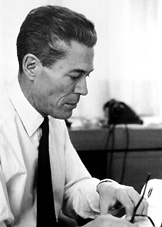Monod, Jacques Lucien (1910–1976)
Jacques Monod was a French biochemist who became director of the Pasteur Institute in Paris and, together with François Jacob and André Lwoff, won the 1965 Nobel Prize in Physiology or Medicine for his work on regulatory gene action in bacteria. He and Jacob developed the idea that messenger RNA carries hereditary information from the nucleus of a cell to the cellular sites during protein synthesis, and the concept of the operator gene controlling the activity of other genes.
 |
In his influential book Chance and Necessity1 (1971), Monod argued that the emergence of life on Earth was the result of a fantastically unlikely sequence of events – "the product of an enormous lottery presided over by natural selection, blindly picking the rare winners from among numbers drawn at utter random." This being the case:
The universe was not pregnant with life, nor the biosphere with man. Our number came up in the Monte Carlo game.
A similar view, in which the human race is regarded as the outcome of a chain of accidents and its existence as pointless, has been expressed by, among others, Bertrand Russell and the Nobel physicist Steven Weinberg.
Reference
1. Monod, Jacques. Chance and Necessity. New York: Alfred A. Knopf (1971).


